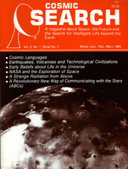![[NAAPO Logo]](../../Images/NAAPOsm.jpg) North American AstroPhysical Observatory (NAAPO)
|
|
In Review:
By: John Kraus "ENTERPRISE"
by Jerry Grey,
"Enterprise" is a book about the future — a breathtaking, exhilarating, refreshing picture of what mankind might accomplish if given half a chance.
Myopic opponents of the space program come in for sharp criticism. Space development is not simply a generator of spin-offs that give housewives a better frying pan or swimmers a pen that writes under water. Space development can lead to a whole new
economy and opportunities for all mankind.
Grey notes that in 1829, Martin Van Buren, Governor of New York and later President of the United States, said,
"Railroad carriages are pulled at the enormous speed of fifteen miles per hour by 'engines' which roar and snort their way through the countryside, setting fire to the crops, scaring the livestock and frightening women and children. The Almighty certainly never intended that people should travel at such breakneck speed."
Further, Grey quotes the famous American astronomer, William Pickering, who first predicted the existence of the planet Pluto, as saying in 1910,
"The popular mind often pictures gigantic flying machines speeding across the Atlantic carrying innumerable passengers in a way analogous to our modern steamships. It seems safe to say that such ideas are wholly visionary."
Zeroing in on the present, Grey quotes Senator William Proxmire of Wisconsin as stating (in October 1977),
"As chairman of the Senate subcommittee responsible for NASA appropriations, I say not a penny for this nutty fantasy (the colonization of space)."
That ideas of space development, continues Grey, "do indeed instill a 'future shock' reaction, not only in Senator Proxmire, but in many others as well, is perhaps a result of our modern heritage of science fiction", but certainly not a result of rational analysis.
Grey calls attention to the perceptive analysis of Robert Frosch, NASA Administrator, who said in 1977,
"There is no sense in trying to look at future situations involving technology in terms of the current system, because technological change does not simply modulate the system; it changes it into a new system. (Italics mine.)
"Certainly there was no market waiting for the automobile. If we used current assessment techniques, we would have concluded" that the automobile would be a silly investment. We would have been appalled at the amount of capital required (500 billion
dollars) to build the road network, the gasoline station network and the whole system. Clearly anybody would have simply said that the country could not produce the capital to do it. Of course, that country ran on horses and could not have produced such capital. "The country that produced the capital for the automobile was also the product of the automobile. The system that produced the capital was a different system. (Italics mine). This is exactly the modeling problem that most economists not only have not coped with, but they have not even discovered it to be a problem!"
As background, Jerry Grey spins a fascinating tale about the dreams, the planning, the battles and the personalities involved in the development and construction of the Space Shuttle, christened "Enterprise" at the insistence of hundreds of thousands of Star Trek fans. The shuttle is the brain-child of Dr. George Mueller, NASA Associate Administrator for Manned Space Flight during the Apollo Moon missions and before that professor of electrical engineering at the Ohio State University.
The idea behind the shuttle is to greatly reduce the cost of space development by means of a reusable space ship. An automobile would not be a very economical means of transportation if you had to discard it after each trip.
Grey gives the reader a clear, penetrating insight into the technical problems and the intricate political wheeling and dealing involved in this mind-boggling project. It is a great tribute to the U.S. technological development and production capability that such a new, difficult and revolutionary concept could be translated into an actual space craft so quickly and economically.
From the shuttle story Grey takes off into the future like a rocket discussing the great potentials and possibilities of space. He says,
"There exists today a small band of dedicated scientists whose faith in their quest has withstood ridicule, budgetary starvation and decades barren of promising results or even vague indications of potential success. Their grail is the elusive concept of probability; their altar is the inconceivable enormity of the cosmos. They seek to detect intelligent life elsewhere in the universe."
And he concludes,
"This search just might turn out to be the most important single action ever taken by mankind." (Italics mine.)
"Enterprise" is a book that makes you tingle with excitement. It's about grand visions of the future and the fact that "the enterprise of space is the future of the human race, and that future is in the process of becoming the present — right now."
Everyone should read "Enterprise"!
|
